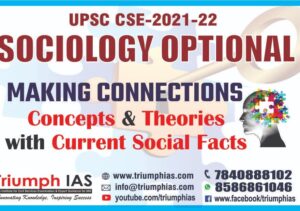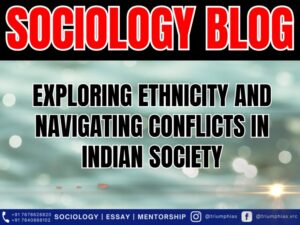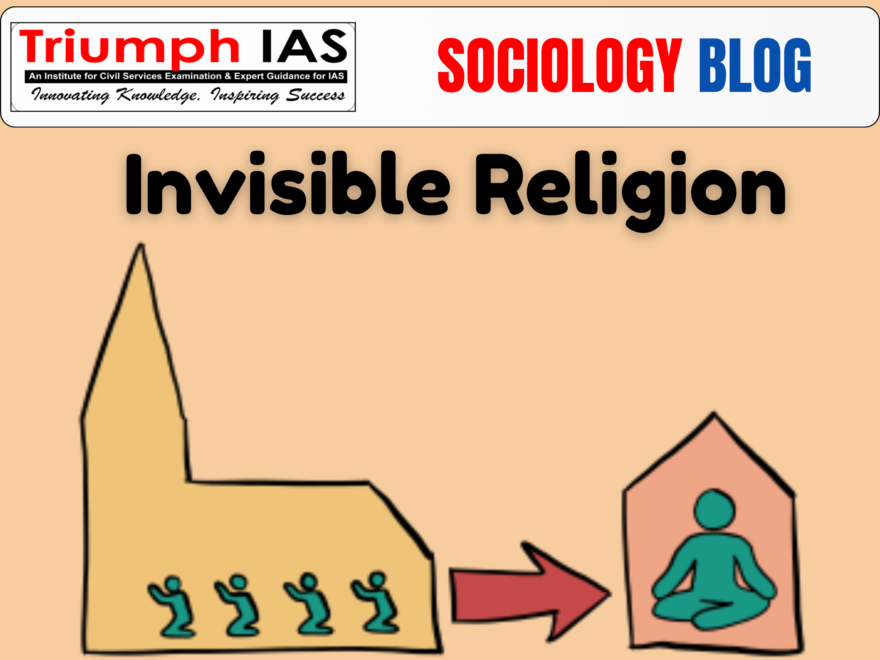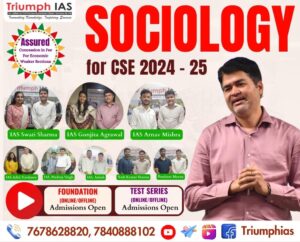Invisible Religion
Relevant for Sociology Optional for Civil Service Examination.
Relevance : Sociology Paper -1 , Unit – Religion & Society
Invisible Religion
- “The Invisible Religion: The Problem of Religion in Modern Society” is a book penned by German sociologist Thomas Luckmann. delves into the concept of invisible religion born out of the challenges faced in maintaining traditional religious practices amid the societal upheavals brought about by the industrial revolution.
- Luckmannn challenges the notion that modern life is devoid of religion. Instead, he asserts a transformation from the older, Church-centered form of religion to a newer, invisible, and largely unexplored form.
- He contends that the secularization process, often seen as a crisis for ecclesiastic-oriented religion by some sociologists, is an irreversible shift. Furthermore, Luckmann broadens the scope of religion, asserting that one’s worldview, considered an objective reality, constitutes an essential aspect of religious experience.
- He critically explores the idea that modern life, far from being inherently irreligious, necessitates a shift in focus from the perceived “irrationality” of religion to the “rationality” inherent in contemporary life. Luckmann investigates the institutionalization of religion in the post-Constantine church and the emergence of a new, “privatized” form of social religion within industrial Western societies
Features of Invisible Religion:
- Origin: The Industrial Revolution prompted substantial societal changes, leading people to alter their residences, workplaces, habits, and worldviews. Traditional religious practices associated with ecclesiastical religion became challenging to maintain. For instance, church attendance in England dwindled from 40% in the 1850s to 10% by 1970.
- Relevance of Religion: Despite diminishing faith in orthodox religious elements, religion continued to serve essential functions such as social integration and solidarity. Studies, like Kaufman’s, suggest that while church attendance declined, the number of believers remained stable.
- Reinterpretation: The rise of individualism has led to personal interpretations of religious doctrines. For example, the belief that ‘Children are a form of God’ has shifted the focus from regular religious practices to individual expressions of compassion.
Forms of Invisible Religion:
- Civic Religion: Involves a religious or quasi-religious reverence for civic values and traditions. Symbols like the flag and national anthem are accorded similar respect and faith as traditional religious symbols.
- Revivalism: Religious activities experience a resurgence, resembling 19th-century movements. This includes the incorporation of religious elements into modern political speeches and public monuments.
- New Sects: Deprived sections of society may create voluntary, exclusive religious groups based on imported values. The example of Dera Sacha Sauda sect in North India illustrates this phenomenon.
- Cultural Importation: Small voluntary groups adopt established religions from different parts of the world. This reflects the idea that a religion dominant in one region can find a cult-like following elsewhere.
- States: While states may adhere to civic religion in public, individuals often follow their private religious scriptures, particularly in personal matters such as marriage and adoption.
- Communalism: In the context of invisible religion, communalism involves a strong allegiance to one’s religious group over society as a whole. It can lead to stereotyping and discrimination against religious minorities.
- Fundamentalism: This involves strict adherence to a set of principles or beliefs, often in opposition to rationalism and humanism. An example is cow vigilantes targeting beef-caters without resorting to legal channels.
Conclusion:
While the theory of secularization has garnered widespread support, doubts persist. Opponents argue that religion remains a significant force in new and unfamiliar forms, emphasizing that it is not merely a cognitive system of dogmas but also a meaningful experience.
Reference: Static Portion
Related Blogs…
 |
 |
Frequently Asked Questions:
1. Question: Define the term “ethnic movement” and provide an example from India.
Answer: An ethnic movement refers to a collective effort by a group sharing common cultural, linguistic, or religious traits, seeking to assert their identity and rights; an example from India is the Khalistan Movement in Punjab.
2. Question: Identify the main objectives behind the Gorkhaland ethnic movement.
Answer: The Gorkhaland ethnic movement primarily seeks to establish a separate state for India’s Nepali-speaking population in the Darjeeling region, advocating for linguistic and cultural recognition and political autonomy.
3. Question: What was the Operation Blue Star, and which ethnic movement was it related to?
Answer: Operation Blue Star was a military action in 1984, aiming to remove Sikh militants hiding in the Golden Temple in Amritsar; it is related to the Khalistan movement, which sought a separate Sikh country.
4. Question: Mention a critical factor that triggered the emergence of ethnic movements in India, as discussed by Dipankar Gupta.
Answer: Dipankar Gupta emphasized that ethnicity is fundamentally a political process, wherein caste and religion, the key components of identity formation, are politicized by leaders for vested interests.
5. Question: What were the primary reasons for the Assam Ethnicity conflicts involving Bodo tribals and Bengali Muslim settlers?
Answer: The Assam Ethnicity conflicts primarily stemmed from issues related to immigration, land rights, and resource allocation, leading to clashes, riots, and evolving relationships among indigenous communities to address challenges.
6. Question: Briefly describe the role of the Dravidian Movement in terms of caste and societal structure.
Answer: The Dravidian Movement, led notably by E.V. Ramasamy, aimed to establish an egalitarian society, focusing on anti-Brahmanism and advocating for equal rights for backward castes, while also introducing reforms like self-respect marriages.
7. Question: Name the prominent ethnic movements in North-East India and specify one common objective.
Answer: Prominent ethnic movements in North-East India include the Nagas’ and Mizos’ struggles; a common objective was to gain autonomy and recognition for their distinct tribal identities and cultural uniqueness.
8. Question: What is the key argument of Gail Omveldt regarding traditional Indian society and multiculturalism?
Answer: Gail Omveldt opposed romanticizing traditional Indian society, arguing that hierarchy has always dominated it and dismissing the notion that multiculturalism is an intrinsic feature of Indian society as a myth.
9. Question: Briefly explain the social hierarchy factor as a contributing element to ethnic movements as suggested by Olzak.
Answer: Olzak suggests that the construction of hierarchies among ethnic communities, which often leads to the suppression of one group by another, is a key factor that can instigate social and ethnic movements.
10. Question: Identify one consequence of the unequal economic development factor within the context of ethnic movements in India.
Answer: One consequence of unequal economic development is the marginalization and underdevelopment of certain groups, leading to feelings of alienation and sometimes initiating ethnic movements as these groups strive for equality and recognition.
GS Related Practices Questions…
To master these intricacies and fare well in the Sociology Optional Syllabus, aspiring sociologists might benefit from guidance by the Best Sociology Optional Teacher and participation in the Best Sociology Optional Coaching. These avenues provide comprehensive assistance, ensuring a solid understanding of sociology’s diverse methodologies and techniques.
META TAGS:
Ethnic Movements, ethnic movements in india, ethnic movement in sociology, Punjab Movement, North-East Ethnic Movements, Gorkhaland Movement, Dravidian Movement, Assam Ethnicity, Ethnic Conflicts, Sociopolitical Impact, India, Ethnic Consciousness, Ethnic Rights, Political Crisis, Economic Development, Cultural Disparities, Khalistan Movement, Nagaland, Mizoram, Multiculturalism, Political Economy, Identity Formation, Social Hierarchies, Bodo Tribals, Bengali Muslim Settlers, Anti-Sikh Riots, Operation Blue Star, Unequal Development, Ethnic Violence, Political Mobilization

Why Vikash Ranjan’s Classes for Sociology?
Proper guidance and assistance are required to learn the skill of interlinking current happenings with the conventional topics. VIKASH RANJAN SIR at TRIUMPH IAS guides students according to the Recent Trends of UPSC, making him the Best Sociology Teacher for Sociology Optional UPSC.
At Triumph IAS, the Best Sociology Optional Coaching platform, we not only provide the best study material and applied classes for Sociology for IAS but also conduct regular assignments and class tests to assess candidates’ writing skills and understanding of the subject.
Choose The Best Sociology Optional Teacher for IAS Preparation?
At the beginning of the journey for Civil Services Examination preparation, many students face a pivotal decision – selecting their optional subject. Questions such as “which optional subject is the best?” and “which optional subject is the most scoring?” frequently come to mind. Choosing the right optional subject, like choosing the best sociology optional teacher, is a subjective yet vital step that requires a thoughtful decision based on facts. A misstep in this crucial decision can indeed prove disastrous.
Ever since the exam pattern was revamped in 2013, the UPSC has eliminated the need for a second optional subject. Now, candidates have to choose only one optional subject for the UPSC Mains, which has two papers of 250 marks each. One of the compelling choices for many has been the sociology optional. However, it’s strongly advised to decide on your optional subject for mains well ahead of time to get sufficient time to complete the syllabus. After all, most students score similarly in General Studies Papers; it’s the score in the optional subject & essay that contributes significantly to the final selection.
“A sound strategy does not rely solely on the popular
Opinion of toppers or famous YouTubers cum teachers.”
It requires understanding one’s ability, interest, and the relevance of the subject, not just for the exam but also for life in general. Hence, when selecting the best sociology teacher, one must consider the usefulness of sociology optional coaching in General Studies, Essay, and Personality Test.
The choice of the optional subject should be based on objective criteria, such as the nature, scope, and size of the syllabus, uniformity and stability in the question pattern, relevance of the syllabic content in daily life in society, and the availability of study material and guidance. For example, choosing the best sociology optional coaching can ensure access to top-quality study materials and experienced teachers. Always remember, the approach of the UPSC optional subject differs from your academic studies of subjects. Therefore, before settling for sociology optional, you need to analyze the syllabus, previous years’ pattern, subject requirements (be it ideal, visionary, numerical, conceptual theoretical), and your comfort level with the subject.
This decision marks a critical point in your UPSC – CSE journey, potentially determining your success in a career in IAS/Civil Services. Therefore, it’s crucial to choose wisely, whether it’s the optional subject or the best sociology optional teacher. Always base your decision on accurate facts, and never let your emotional biases guide your choices. After all, the search for the best sociology optional coaching is about finding the perfect fit for your unique academic needs and aspirations.
To master these intricacies and fare well in the Sociology Optional Syllabus, aspiring sociologists might benefit from guidance by the Best Sociology Optional Teacher and participation in the Best Sociology Optional Coaching. These avenues provide comprehensive assistance, ensuring a solid understanding of sociology’s diverse methodologies and techniques. Sociology, Social theory, Best Sociology Optional Teacher, Best Sociology Optional Coaching, Sociology Optional Syllabus.
Best Sociology Optional Teacher, Sociology Syllabus, Sociology Optional, Sociology Optional Coaching, Best Sociology Optional Coaching, Best Sociology Teacher, Sociology Course, Sociology Teacher, Sociology Foundation, Sociology Foundation Course, Sociology Optional UPSC, Sociology for IAS,
Follow us :



Find More Blogs…
| Compare and contrast Karl Marx’s and Max weber’s | Karl Marx- Historical Materialism |
| Talcott Parsons : Social system | Scope of the subject and comparison with other social sciences |
KEYWORD: Invisible Religion,Invisible Religion,Invisible Religion,Invisible Religion,Invisible Religion,Invisible Religion,Invisible Religion,Invisible Religion,Invisible Religion,Invisible Religion,Invisible Religion,Invisible Religion,Invisible Religion,Invisible Religion,Invisible Religion,Invisible Religion,Invisible Religion,Invisible Religion,Invisible Religion,Invisible Religion,


